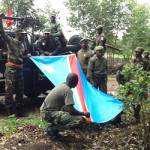“ The Directorate of Movement of March 23 informs the national and international community that it has decided from this day on, to put an end to its rebellion and to pursue, by purely political means, the search for solutions to the root causes that led to its creation.
The chief of general staff and the commanders of all major units are requested to prepare troops for disarmament, demobilisation and reintegration on terms to be agreed with the government of Congo.” It is in these terms that the Bertrand Bisimwe,President of M23 Congolese rebels, backed by the Rwandan government and military, announced in a posting on M23 rebels’s Facebook page on November 5, 2013, the demise of one of the most brutal and ruthless rebellions in the Great Lakes Region of Africa.
A Humiliating Defeat for M23 Rebels and Rwandan Government and Military leaders
The demise came after the M23 rebels lost one of their latest stronghold to the Congolese Government defense forces, FARDC, in Eastern DRC. After almost 10 days, the rebels have been pounded, killed, and pushed out the major towns they had held for a year. Within six days, the M23 rebels were driven out of the strategic border town of Kibumba, the military stronghold of Rumangabo, the advanced bases in Kiwandja, the commercial hub of Rutshuru, and from their headquarters in Bunagana.
Most of M23 fighters also abandoned weapons and fled to Rwanda (see our article:US Secretary of State, John Kerry’s and British Foreign Secretary Minister William Hague’s Warnings to Paul Kagame As M23 Rebels of November 1, 2013)
A couple of hundred hardline fighters, mostly from the Rwandan Defense Forces, withdraw from Bunagana to the forest and hills of Tshanzu and Runyonyi, where they had previously stashed a large quantity of weapons and ammunitions and built fortifications and trenches. FARDC, with the help of UN Intervention Brigade Forces composed of Tanzanian, Malawian and South African forces, pounded them for almost four days. The remaining fighters fled early this morning, November 5 2013 to Rwanda and Uganda. Faced with this humiliating defeat, M23 rebels President had no other option, than offering the surrender. More than a defeat for M23 rebels, it is a humiliating setback for Rwandan dictator General Paul Kagame. He personally founded, funded, and provided support in equipment and troops, including his Special Forces, to the M23 rebels.
SADC and ICGL Urge Peace Negotiations and Arrest of M23 Rebels Leader by Rwanda and Ugandan Government.
The surrender coincides with a joint summit of Southern African Development Community (SADC) and the International Conference on the Great Lakes Region (ICGLR), held in Pretoria, South Africa, since Monday, November 4, 2013.
During the joint SADC and ICGLR Summit, co-chaired by Malawian President Dr. Joyce Banda of Malawi, SADC head, Ugandan President Yoweri Museveni, ICGLR Head, and South African President Jacob Zuma, the leaders urged the rebels to disarm and join the peace process within the framework for Peace, Security and Cooperation for DRC and the region, signed in Addis-Abeba on February 24, 2013 (see our article:UN Special Envoy in Great Lakes: Will Rwandan President Kagame Seize the Opportunity of March 7, 2013)
In the joint Communique at the end of the Summit, read by Dr. Stergomena Lawrence Tax, SADC Executive Secretary, the Summit urged the signatories to the Peace, Security and Cooperation Framework for DRC and the Region to implement commitments made towards the actualization of the agreement. In the resolution, all the signatories are urged to abide to the Framework provisions. Hence, Uganda and Rwanda will have to arrest and hand over all suspected M23 rebels to DRC government.
M23 Defeat Opens Another Opportunity for Peace in the Region.
Now that the M23 rebels problem is subsiding, attention is being directed towards the remaining rebels, especially the Rwandan Democratic Liberation Forces of Rwanda (FDLR) and Ugandan Allied Democratic Forces (ADF/NALU). Sources in South Africa told AfroAmerica Network that, during the Summit, the discussions turned to the proposition by the Tanzanian President Jakaya Kikwete to urge Rwandan and Ugandan leaders, General Paul Kagame and Yoweri Museveni, to engage in peace negotiations with their respective rebellions in order to bring peace in the region (see our article: Talk to Your Armed Opposition, Tanzanian President Kikwete Tells Yoweri Museveni of Uganda, Paul Kagame of Rwanda, and Joseph Kabila of DRC of May 26, 2013).
However, this approach appears to be a far dream, for now. Rwandan dictator General Paul Kagame, long accused by the United Nations, the United States, France, Belgium, and other governments and independent observers and human rights groups of supporting M23 rebels and being behind the chaos in Eastern DRC, has decided to boycott the SADC and ICGLR summit. He instead send his Minister of Foreign Affairs, Louise Mushikiwabo, without any power of decision (see here)
With the defeat of M23 rebels, a big step has been made in the right direction for peace in the Great Lakes of Africa. However, as the leaders of the Rwandan opposition have outlined, before Rwanda and Ugandan government talk to their armed rebellions, peace may be still a long way (see our article UN Special Envoy in Great Lakes: Will Rwandan President Kagame Seize the Opportunity of March 7, 2013)
©2013 AfroAmerica Network. All Rights Reserved.





Comments on this entry are closed.